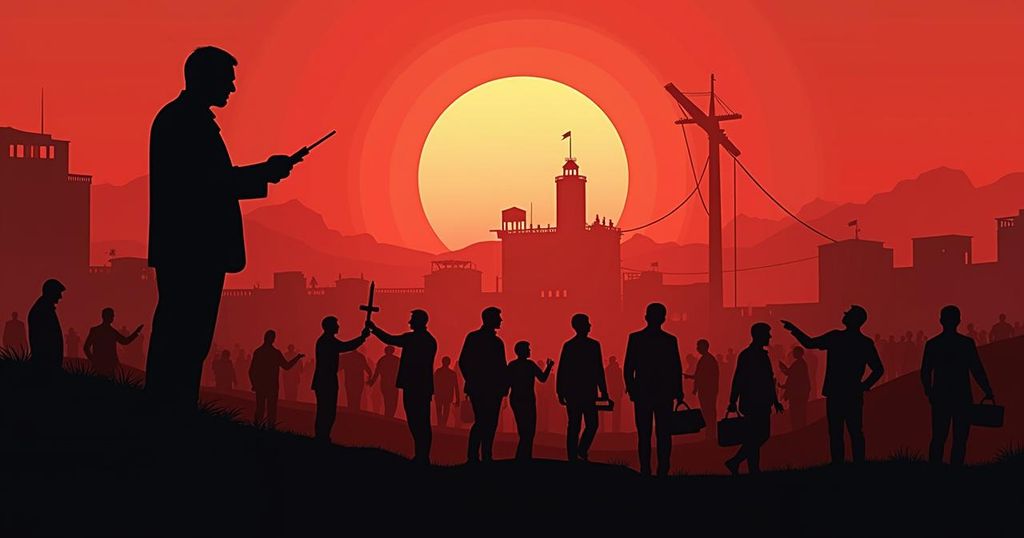The Stakes of Tunisia’s Presidential Election: A Pivotal Moment in Democracy

The Tunisian presidential election on Sunday is the first since President Kais Saied’s consolidation of power, prompting concerns over civil liberties and democratic integrity. With only three candidates, including one incarcerated, the election is perceived as rigged, reflecting widespread public discontent with conventional politics. The current environment is marred by suppression of dissent, a weakened judiciary, and controlled media, raising concerns about the trajectory of democracy in Tunisia.
The upcoming presidential election in Tunisia, taking place on Sunday, signifies a pivotal moment as the nation assesses the political landscape shaped by President Kais Saied’s contentious rule. Saied, who ascended to power as an independent candidate in 2019, later implemented a controversial power grab in July 2021, which included the suspension of parliament and the dismissal of the prime minister, Hichem Mechichi, thereby consolidating executive control. Human rights organizations, both international and domestic, have voiced strong concerns regarding the degradation of civil liberties and freedom of speech under Saied’s administration, highlighting escalating arbitrary arrests targeting critics and political adversaries. Observers both within Tunisia and internationally view the forthcoming election as an unlevel playing field, suggesting that Saied is likely to secure a second term amidst widespread public disillusionment with conventional party politics. Historically, Tunisia emerged from the Arab Spring era as a potential beacon of hope for democratic governance, particularly following the 2011 ousting of long-time dictator Zine El Abidine Ben Ali. The Jasmine Revolution sparked a period of intense political engagement, with civil society organizations playing a crucial role in steering the country towards parliamentary democracy, even amidst episodes of political violence and instability. Despite the chaotic governance that ensued—marked by nine successive governments in ten years—Tunisia achieved notable legislative milestones, such as enacting laws to combat violence towards women and racism. However, the current electoral environment appears grim, with only three candidates contesting, including one who is incarcerated and another who has previously supported Saied. Notably, fourteen prospective candidates were rejected by the Independent High Authority for Elections (ISIE), adding to suspicions regarding the credibility of the electoral process, especially after significant restructuring of the ISIE under Saied’s influence. Furthermore, the judiciary has faced considerable erosion of independence following Saied’s dissolution of the elected High Judicial Council and the arbitrary dismissal of dozens of judges. In parallel, the media landscape has been stifled, with the chilling effect of Decree 54 leading to the suppression of dissenting voices. While there have been recent protests against government repression and electoral manipulation, these have not attained the scale of earlier demonstrations, underscoring a fragmented civil society. Many civil organizations have faced closures or attacks, and prominent activists and critics have faced imprisonment. Despite these challenges, small-scale protests continue to express public discontent and demands for democracy.
Tunisia’s political climate has taken a dramatic turn since Kais Saied’s rise to power, marked by his unilateral actions that many perceive as authoritarian. The upcoming presidential election will be the first since Saied’s controversial expansion of authority, set against a backdrop of deteriorating civil liberties and a fragmented political landscape. The memory of Tunisia’s earlier democratic aspirations, post-Arab Spring, adds a layer of poignancy to the current electoral situation, as the nation grapples with the consequences of Saied’s governance and the implications for future political engagement.
In summary, the impending presidential election in Tunisia represents a significant test of the country’s democratic processes under Kais Saied’s regime. With the election viewed as lacking fairness and transparency, the growing concerns over political repression, judicial independence, and media censorship pose serious questions about the future of democracy in Tunisia. Despite minor protests and expressions of dissent, the challenges facing the electoral landscape indicate a troubling trend that may persist unless substantial political reform occurs.
Original Source: www.aljazeera.com







